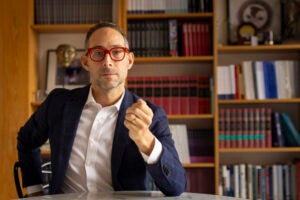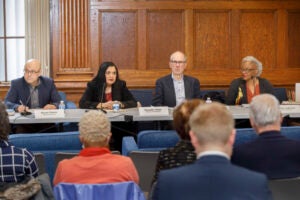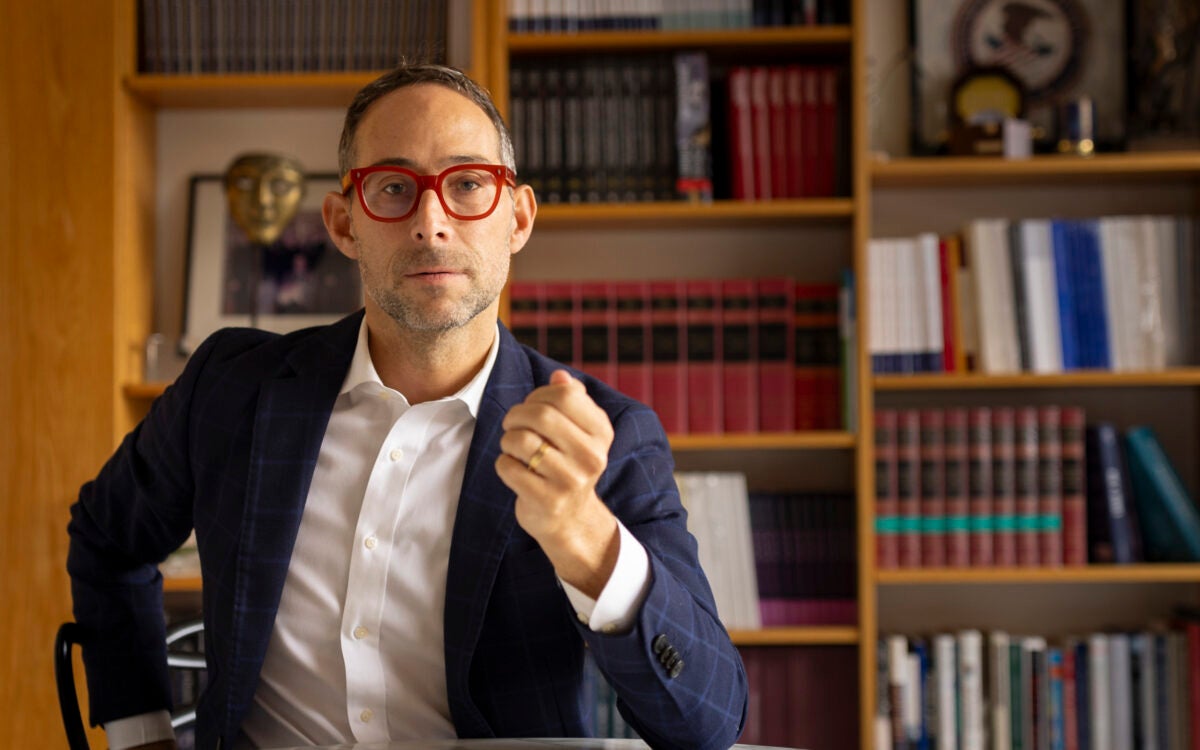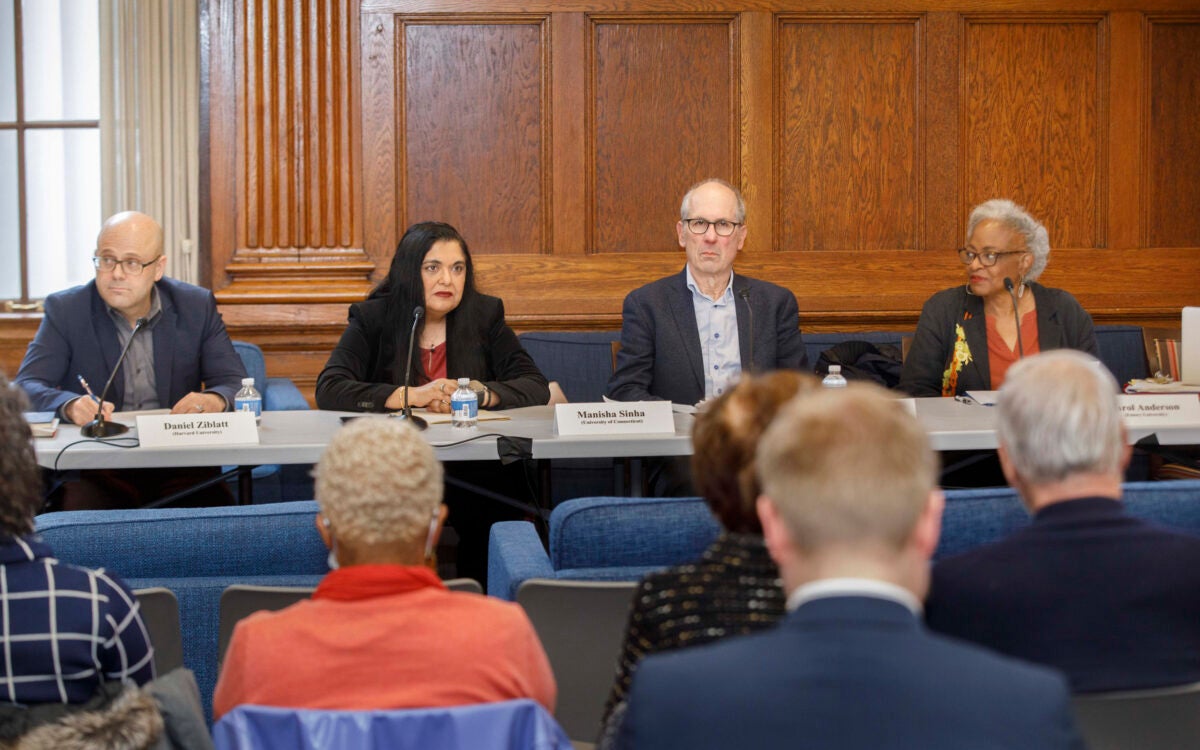Royal talks politics with students
French presidential candidate discusses the future of France’s Socialist Party
On the eve of Super Tuesday, Harvard students gathered to discuss politics — French politics, that is — with the first woman in French history to run as a major presidential candidate.
Socialist Party candidate Ségolène Royal, who lost the presidency to Nicolas Sarkozy in May 2007, led a seminar for about 40 students Feb. 4 on the future of France’s left wing at the Minda de Gunzburg Center for European Studies (CES).
Royal, who is seeking to become the secretary general of the Socialist Party, spoke evenly but forcefully about the need for the left to retain its “core values” while making a fresh start to put “people first before ideology.”
“Left leaders now know that core values are compatible with new solutions. But those solutions must find their roots in the people,” said Royal, president of the Poitou-Charentes region and a former government minister and National Assembly member.
Quoting Thomas Jefferson, Royal said socialists must build “from the bottom up.” This means the party must “really listen to the people” even when their sentiments run counter to party orthodoxy.
“When the left is attentive to the people’s interests, it realizes that welfare can turn out to be a trap for those it is meant to save,” she said in English, reading from a prepared text. The left, she insisted, will never stop talking about human rights, but must broaden the dialogue to include individual responsibility. Private profit is acceptable, but society must draw the line between what is acceptable profit and “unacceptable greed.”
“This is about choosing the power of our society, our community, to achieve what people are unable to achieve when left on their own,” she said.
Echoing issues in the American presidential race, Royal said that the French left has allowed conservatives to hijack the issue of “moral values” and that the left must be prepared to fight to gain the moral high ground.
“Conservative politicians have also attempted to reverse common sense,” she asserted. But social security, minimum wage, and investing in public infrastructure “do not hurt the economy at all.”
Royal, who is in Massachusetts this week for a series of events, including a public address at 6 p.m. today (Feb. 7) at the John F. Kennedy School of Government, touched on her party’s reaction to her defeat. Sarkozy garnered about 53 percent of the vote compared with Royal’s 47 percent. “Reactions are the same all over the world: One looks for someone to blame.”
But such defeats are “just part of the life cycle of every party,” she said. “The only thing to do is to work on ourselves as hard as we possibly can and to find the reasons for our failure and to find solutions to put things on the right track for the future. There is no shortcut to political success.”
With Arthur Goldhammer, chair of the seminar for visiting scholars at the Center for European Studies, serving as moderator and translator, students questioned Royal about immigration, wooing new party members, and the balance between diversity and assimilation in French society.
In response to a question by Jaclyn Granick ’08, a social studies concentrator, about how to increase political participation, Royal, now switching to French, acknowledged that the base of the Socialist Party was too small. Freshman Idriss Fofana, noting that Sarkozy’s control of his Union for a Popular Movement party was legendary, asked how the demoralized socialists could maintain party discipline. The most important thing for a party is service to its causes, Royal said, adding, “Cause is the ultimate discipline.”
As for the issue of immigration — a political hot button in France as well as the United States — Royal said that not all illegal aliens can become legal and decisions should be made on a case-by-case basis. Ultimately, she said, the solution to illegal immigration is to resolve inequalities between developed and undeveloped countries.
Jason Burke, a junior, asked a provocative question about Sarkozy’s effective use of the slogan “Together Everything Becomes Possible.” When political “branding” is a key issue, “how does the left prevent the right from stealing its ideology for elections?” he asked. Indeed, Royal agreed that her opponent had “very cleverly mixed references from all parts of the political spectrum in his campaign.” However, now “reality has to be faced.” And, Royal contends, the reality is “inequities are greater than they have ever been before.”
Patricia Craig, CES executive director, praised the quality of the students’ questions, which focused on issues rather than personal gossip. (Sarkozy just wed an Italian model and singer 10 years his junior; Royal has split from a longtime partner.)
Royal, said Goldhammer, who writes a blog on French politics (http://artgoldhammer.blogspot.com), is poised to take another run at the presidency. “She’s more clearly focused on the need to get the party behind her,” he said.




